
Eve Arden was an American film, radio, stage and television actress. She performed in leading and supporting roles for nearly six decades.
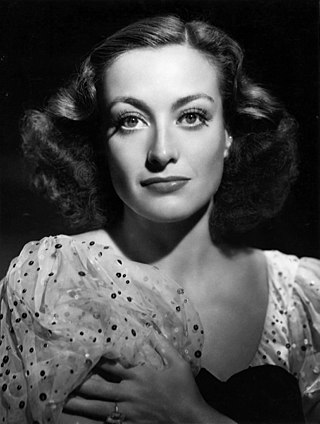
Joan Crawford was an American actress. She started her career as a dancer in traveling theatrical companies before debuting on Broadway. Crawford was signed to a motion picture contract by Metro-Goldwyn-Mayer in 1925. Initially frustrated by the size and quality of her parts, Crawford launched a publicity campaign and built an image as a nationally known flapper by the end of the 1920s. By the 1930s, Crawford's fame rivaled MGM colleagues Norma Shearer and Greta Garbo. Crawford often played hardworking young women who find romance and financial success. These "rags-to-riches" stories were well received by Depression-era audiences and were popular with women. Crawford became one of Hollywood's most prominent movie stars and one of the highest paid women in the United States, but her films began losing money. By the end of the 1930s, she was labeled "box office poison".

Stanislaus Pascal Franchot Tone was an American actor, producer, and director of stage, film and television. He was a leading man in the 1930s and early 1940s, and at the height of his career was known for his gentlemanly sophisticate roles, with supporting roles by the 1950s. His acting crossed many genres including pre-Code romantic leads to noir layered roles and World War I films. He appeared as a guest star in episodes of several golden age television series, including The Twilight Zone and The Alfred Hitchcock Hour while continuing to act and produce in the theater and movies throughout the 1960s.
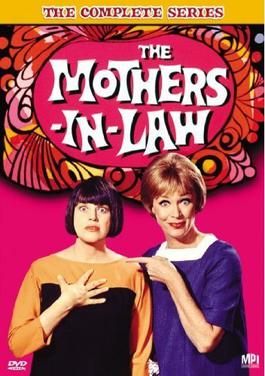
The Mothers-in-Law is an American sitcom featuring Eve Arden and Kaye Ballard as two women who were friends and next-door neighbors until their children's elopement made them in-laws. The show aired on NBC television from September 1967 to April 1969. Executive produced by Desi Arnaz, the series was created by Bob Carroll, Jr., and Madelyn Davis.

Dancing Lady is a 1933 American pre-Code musical film starring Joan Crawford and Clark Gable, and featuring Franchot Tone, Fred Astaire, Robert Benchley, and Ted Healy and his Stooges. The picture was directed by Robert Z. Leonard, produced by John W. Considine Jr., and was based on the novel of the same name by James Warner Bellah, published the previous year. The movie had a hit song in "Everything I Have Is Yours" by Burton Lane and Harold Adamson.

Sadie McKee is a 1934 American pre-Code, romantic-drama film directed by Clarence Brown, starring Joan Crawford, and featuring Gene Raymond, Franchot Tone, Edward Arnold, and Esther Ralston. The film is based on the 1933 short story "Pretty Sadie McKee", by Viña Delmar. Crawford plays the title character, from young working girl through poverty, a marriage into enormous wealth and finally a (seemingly) settled life on her own terms.
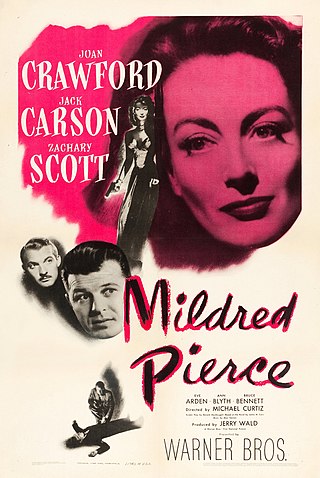
Mildred Pierce is a 1945 American melodrama/film noir directed by Michael Curtiz and starring Joan Crawford, Jack Carson, and Zachary Scott, also featuring Eve Arden, Ann Blyth, and Bruce Bennett. Based on the 1941 novel by James M. Cain, this was Crawford's first starring role for Warner Bros., after leaving Metro-Goldwyn-Mayer, and she won the Academy Award for Best Actress. In 1996, Mildred Pierce was deemed "culturally, historically, or aesthetically significant" and selected for preservation in the United States Library of Congress National Film Registry.
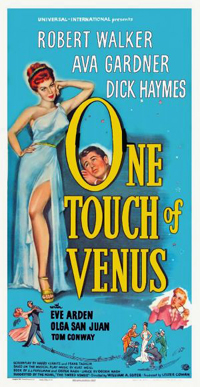
One Touch of Venus is a 1948 American black-and-white romantic musical comedy film directed by William A. Seiter starring Robert Walker, Ava Gardner, Dick Haymes, and Eve Arden. released by Universal-International, and based on the 1943 Broadway musical of the same name, book written by S. J. Perelman and Ogden Nash, with music composed by Kurt Weill. However, the film omits most of Weill's music. The actors did their own singing, except for Ava Gardner (Venus) whose singing was dubbed by Eileen Wilson. The plot is from an original 1885 novella by Thomas Anstey Guthrie.
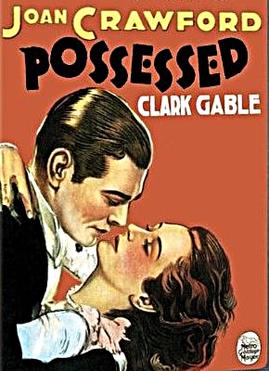
Possessed is a 1931 American pre-Code drama film directed by Clarence Brown, starring Joan Crawford and Clark Gable and released by Metro-Goldwyn-Mayer. The film is the story of Marian Martin, a factory worker who rises to the top as the mistress of a wealthy attorney. The screenplay by Lenore J. Coffee was adapted from the 1920 Broadway play The Mirage by Edgar Selwyn. Possessed was the third of eight film collaborations between Crawford and Gable.
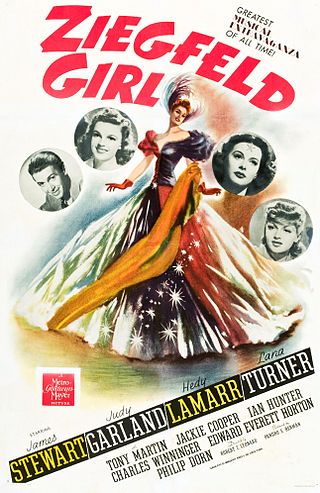
Ziegfeld Girl is a 1941 American musical film directed by Robert Z. Leonard and starring James Stewart, Judy Garland, Hedy Lamarr, Lana Turner, Tony Martin, Jackie Cooper, Eve Arden, and Philip Dorn. The film, which features musical numbers by Busby Berkeley, was produced by Metro-Goldwyn-Mayer.
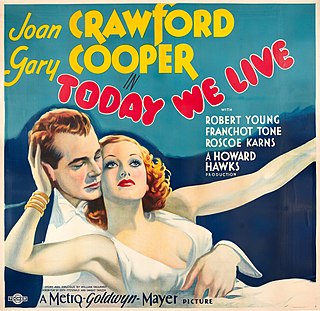
Today We Live is a 1933 American pre-Code romance drama film produced and directed by Howard Hawks and starring Joan Crawford, Gary Cooper, Robert Young and Franchot Tone.

The Bride Wore Red is a 1937 American romantic comedy drama film directed by Dorothy Arzner, and starring Joan Crawford, Franchot Tone, Robert Young and Billie Burke. It was based on the unproduced play The Bride from Trieste by Ferenc Molnár. In this "rags to riches" tale, Crawford plays a cabaret singer who poses as an aristocrat. This film is the last of the seven films that Crawford and co-star Franchot Tone, then her husband, made together.
These are the films directed by the pioneering American filmmaker D. W. Griffith (1875–1948). According to IMDb, he directed 518 films between 1908 and 1931.

Gertrude Dolores Messinger was an American film actress known for her B-movie roles from the 1930s through the 1950s. She began as a child actor in silent films, but found her greatest fame in talkies of the 1930s. During her career she appeared in more than 50 motion pictures, with particular success in westerns.
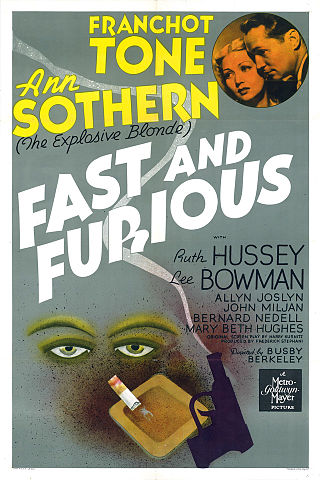
Fast and Furious is a 1939 American mystery comedy film directed by Busby Berkeley. The film stars Franchot Tone and Ann Sothern as Joel and Garda Sloane, a crime-solving married couple who are also rare book dealers. It is the last of a Metro-Goldwyn-Mayer trilogy, along with Fast Company (1938) and Fast and Loose (1939). However, different actors played the couple each time.

Midnight Mary is a 1933 American pre-Code crime drama film directed by William A. Wellman and starring Loretta Young, Ricardo Cortez, and Franchot Tone.

The Wife Takes a Flyer is a 1942 romantic comedy film made by Columbia Pictures, directed by Richard Wallace. The film stars Joan Bennett and Franchot Tone. The screenplay of The Wife Takes a Flyer was written by Jay Dratler, Gina Kaus and Harry Segall. The film's music score is by Werner R. Heymann.
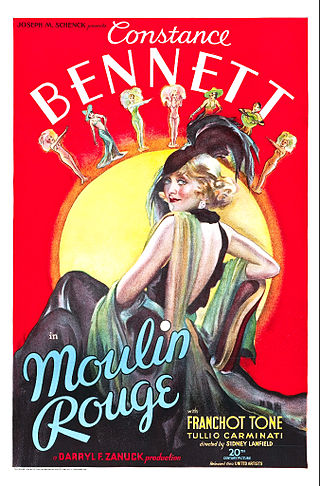
Moulin Rouge is an American pre-Code musical film released on January 19, 1934, by United Artists, starring Constance Bennett and Franchot Tone. It contained the songs "Coffee in the Morning and Kisses in the Night", and "Boulevard of Broken Dreams" with music by Harry Warren and lyrics by Al Dubin. Lucille Ball appears in an uncredited role as a show girl in the film. It has no relation to any other films of/with the same name. The cast also includes Tullio Carminati, Helen Westley, Russ Brown, Hobart Cavanaugh and Georges Renavent.
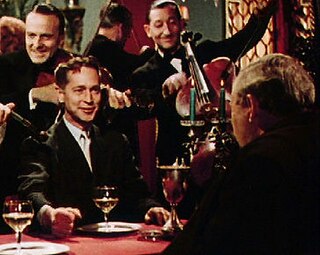
The Man on the Eiffel Tower is a 1950 American Ansco Color film noir mystery film starring Charles Laughton, Franchot Tone, Burgess Meredith, and Robert Hutton. Ultimately directed by Meredith, it is based on the 1931 novel La Tête d'un homme by Belgian writer Georges Simenon featuring his detective Jules Maigret. The film was co-produced by Tone and Irving Allen as A&T Film Productions and released by RKO Radio Pictures. Much of the outdoor action occurs in familiar Paris locales, including the Eiffel Tower, the Seine, and Pigalle.

Our Miss Brooks is a 1956 American comedy film starring Eve Arden, Gale Gordon, Don Porter and Robert Rockwell, based on the radio and TV sitcom hit on CBS of the same name. Directed by Al Lewis, who was the chief writer for the radio and TV editions, and written by both him and Joseph Quillan, the film disregarded the past four years of television and started with a new storyline. It was distributed by Warner Brothers.



















